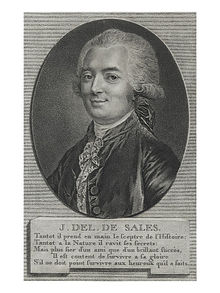Michael Hissmann
Hissmann, Michael (m)
Michael Hissmann (1752-1784) was a German philosopher of some repute. He also translated a number of French works into German., including that of Delisle de Sales, in which he added his own view that Atlantis had been situated in the Atlantic contrary to the view of the original author. He died of tuberculosis while in his early thirties,*[in the same year that he became a full professor. For German readers, Thorwald C. Franke has a more extensive account[1255.385] of Hissmann’s work.]*
Delisle de Sales, Jean-Baptiste Izouard
Jean-Baptiste Izouard Delisle de Sales (1741-1816) was a French philosopher who ventured into the dangerous waters of speculative atlantology with the idea that Atlantis had been originally situated in the  Caucasus. In volume 3[1013] of his multi-volume work, Histoire nouvelle de tous les peuples du monde ou Histoire des homes, he hypothesized that following a catastrophic flood in that region, refugees migrated east and west. Some ended up in the Atlas Mountains from where they got their name. Delisle de Sales believed that the Atlantis of Plato was situated between Italy and Carthage. This view was a consequence of identifying Homer’s Ogygia, the island of Calypso, with Atlantis. He then assumed that Sardinia was a remnant of this island.This led to his identification of the Gulf of Tunis as the location of the Pillars of Heracles. The original French text of Book III, which relates to Atlantis can be read online(a).
Caucasus. In volume 3[1013] of his multi-volume work, Histoire nouvelle de tous les peuples du monde ou Histoire des homes, he hypothesized that following a catastrophic flood in that region, refugees migrated east and west. Some ended up in the Atlas Mountains from where they got their name. Delisle de Sales believed that the Atlantis of Plato was situated between Italy and Carthage. This view was a consequence of identifying Homer’s Ogygia, the island of Calypso, with Atlantis. He then assumed that Sardinia was a remnant of this island.This led to his identification of the Gulf of Tunis as the location of the Pillars of Heracles. The original French text of Book III, which relates to Atlantis can be read online(a).
*Jason Colavito has translated a relevant section of volume IV of Histoire Philosophique du Monde Primitif? [1669].*
Delisle de Sales, writing in the 18th century cited an anonymous source who placed Atlantis in Taprobane, considered at the time to be a reference to Ceylon (now Sri Lanka), not Dhani Irwanto’s Indonesian Kilmantan.
Michael Hissmann (1752-1784) who translated the first book of Delisle de Sales’ Histoire into German added his own commentary that supported an Atlantic location for Atlantis.
It is worth noting that Delisle de Sales included Fabre d’Olivet, the occultist, in his social circle.
